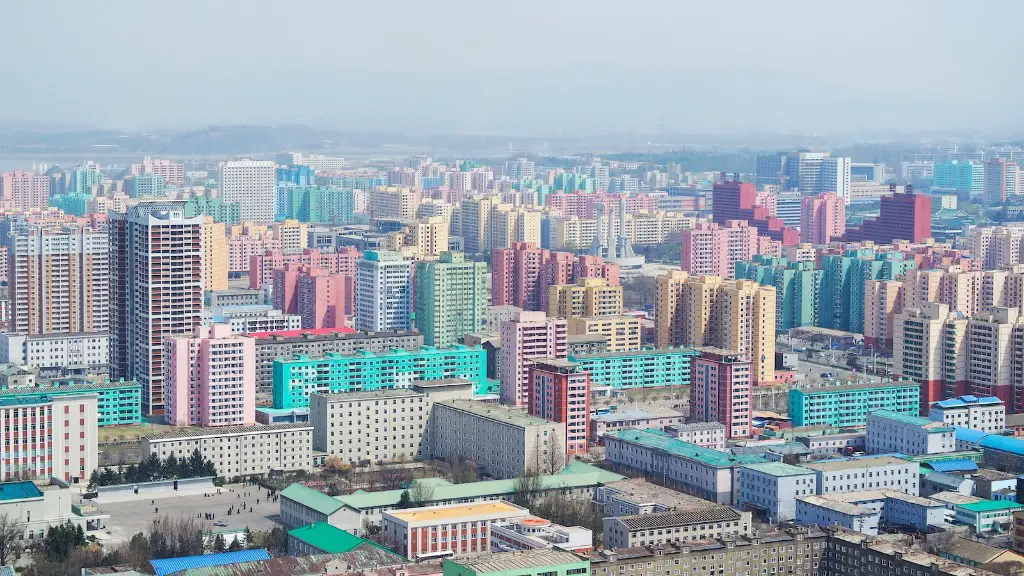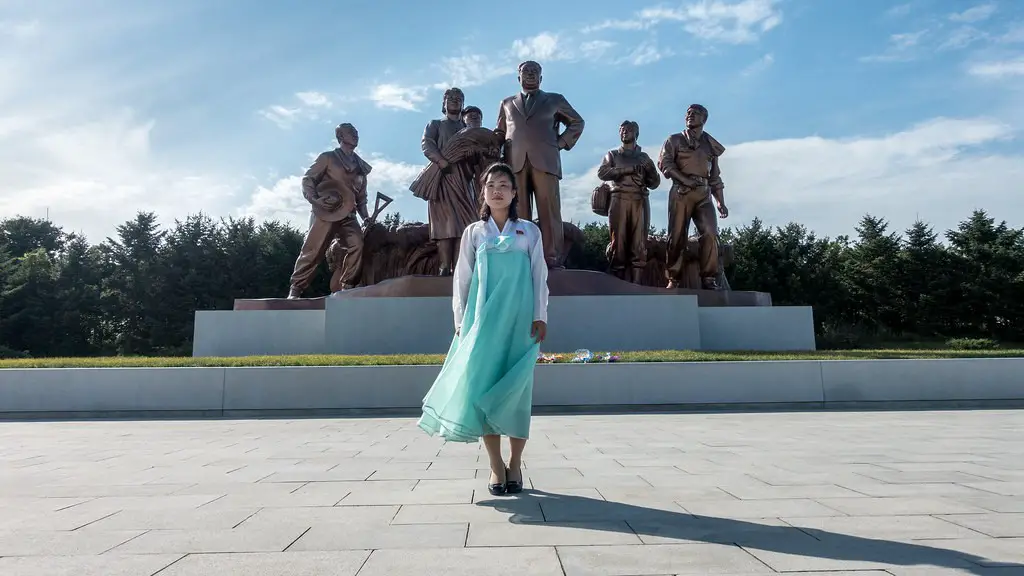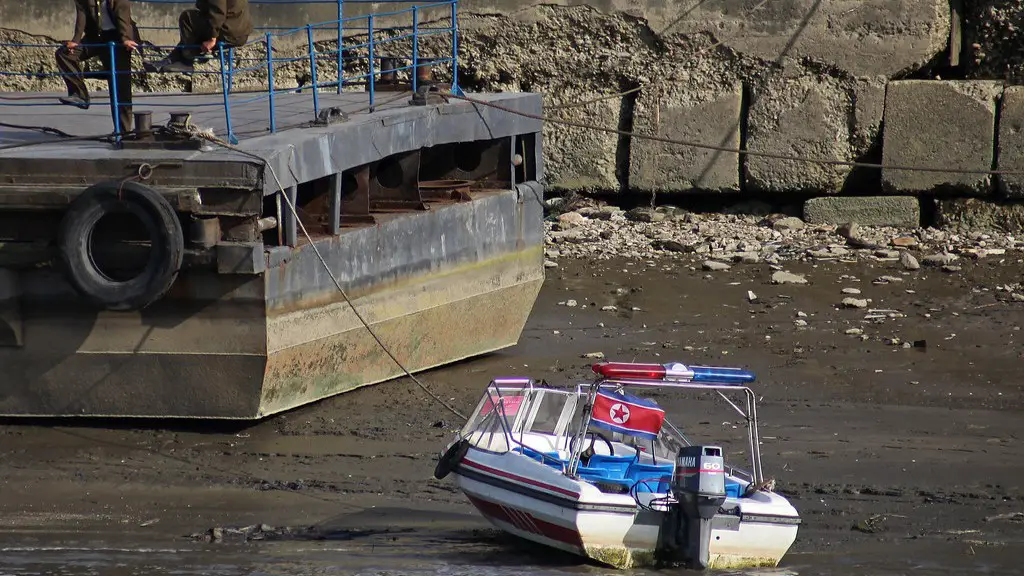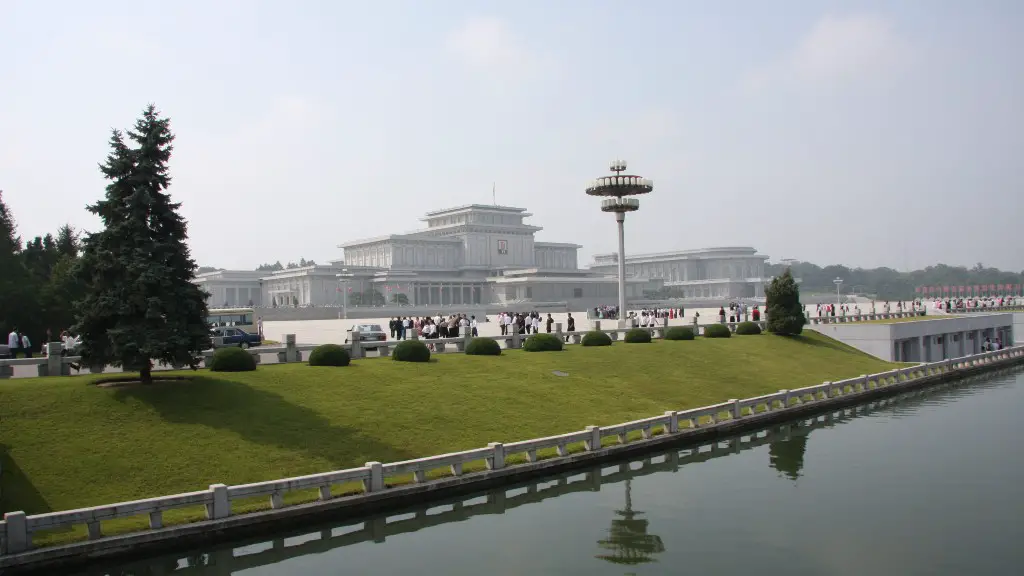In the global context, North Korea causes uneasiness and tension among major countries. North Korea is a highly isolated nation with evidence of nuclear weapons capability, led by a dictator who has threatened use of force against the US and its allies. The main question concerning North Korea is whether a war is likely to occur given the unstable relationship between the US and North Korea. To understand the dynamics behind this situation it is necessary to delve into the reasons why a war might happen while considering potential solutions available in order to prevent it.
Many experts agree that war with North Korea is unlikely to occur. The most obvious reason for this is the power dynamic between the US and North Korea. The US military is technologically sophisticated, far superior to North Korea’s, and it would be difficult for North Korea to pose a real danger to the US and its allies militarily. However, North Korea has expressed its willingness to use nuclear weapons in combat and this could give them a strategic advantage, causing the US and its allies to hesitate when considering military action.
Furthermore, North Korea’s leader, Kim Jong Un, is considered to be unpredictable and erratic, making it difficult to accurately assess his intentions and plan for any potential outcomes arising from a conflict. This makes it difficult to build an effective strategy to prevent war from occurring. Additionally, the US does not want to provoke a full-scale war with North Korea as it could lead to casualties for both US citizens and North Koreans and large-scale damage to property. This could be devastating for the US economy, making war an unattractive prospect for US leaders.
In spite of these facts, the possibility of war is still a reality that cannot be discounted. The US and its allies are increasingly concerned about North Korea’s nuclear weapons capabilities, as well as its missile tests, which violate UN resolutions. As a result, the US has imposed economic sanctions on North Korea, which have had limited success in deterring the country from further provocations. This could lead to a situation in which North Korea feels it has no choice but to act aggressively against the US and its allies, potentially leading to a war.
However, some experts point to diplomatic solutions as a potential way to prevent war with North Korea. Diplomatic talks between the US, South Korea, China and Russia could help to de-escalate tensions, as each country could put forward their own points of view and work towards finding a solution that would benefit all parties involved. Additionally, US President Donald Trump has expressed his willingness to meet with Kim Jong Un face-to-face, which could be an important breakthrough in improving relations between the two countries. This could potentially lead to a diplomatic resolution and prevent war from occurring.
Overall, it is uncertain whether a war between the US and North Korea is likely to occur. There are various factors to consider when assessing this situation, such as the disparity in power between the two countries, the unpredictability of Kim Jong Un, and the potential for a diplomatic solution. While a war is possible, it is difficult to predict what will happen in the future as the situation is highly complex and ever-changing.
North Korean Leadership
The North Korean system is an authoritarian dictatorship and has been in place since the end of the Korean War in 1953. In 2017, Kim Jong Un became the Supreme Leader and has maintained control through a combination of oppressive policies and coercion. The state has a single party system and has a policy of ‘Juche’ or self-reliance, where the Kim family is presented as the saviour of the nation. In addition to this, North Korea also has a cult of personality where the leaders Kim Il-Sung and Kim Jong Il are presented as gods. These policies limit criticism of the regime, strengthen loyalty and create a climate of fear which limits freedoms.
The oppressive nature of the North Korean leadership has implications for any potential war with the US. Kim Jong Un has strong control over the country and could use this to instil fear and hatred towards the US in the population. This could push the population to support military action and it could limit US citizens’ capabilities to respond to any potential conflict. Additionally, Kim Jong Un has shown a willingness to violate international law and it is uncertain whether he would be willing to negotiate with other countries. This could affect the potential success of diplomatic solutions.
Overall, North Korean leadership is an important factor to consider when assessing the situation and the potential for war with the US. Kim Jong Un’s authoritarian rule makes it difficult to predict his actions, which could have implications for any potential conflict.
International Pressure
In recent years, international pressure has increased on North Korea in response to its nuclear weapon tests and other provocations. In addition to economic sanctions imposed by the US, the UN Security Council has also passed numerous resolutions imposing additional sanctions. These sanctions restrict North Korea’s access to funds and technology and aim to limit their ability to continue their nuclear weapons programs.
International pressure could achieve two goals. Firstly, it could pressure North Korea to negotiate a diplomatic solution to the conflict and prevent war from occurring. Secondly, it could limit the capabilities of North Korea if war does take place, as the sanctions restrict their ability to access the resources they need to carry out a war.
However, North Korea has proven resilient to international pressure in the past and is unlikely to be swayed by it in a potential conflict. The sanctions have not prevented North Korea from continuing their nuclear weapons programs or other provocations. Additionally, North Korea has a history of antagonizing the international community in order to gain leverage in negotiations. This could mean that the pressure has limited effect in preventing war.
Overall, international pressure could play an important role in preventing war from occurring. However, it is uncertain whether it will be effective in the current situation. North Korea has proven that it is unwilling to bow to international pressure in the past and it is uncertain whether this will change in the near future.
Regional Impact
A potential conflict with North Korea would have implications far beyond the US and North Korea. In particular, the countries in the region would also be greatly impacted. South Korea, China, Japan and Russia would all be affected as they are neighbouring countries and have strong ties with North Korea.
South Korea in particular would be badly affected, as it is the closest neighbour to North Korea and has the most to lose. South Korea relies heavily on trade with the US and its allies, which could be disrupted in the case of a war. In addition, a war would bring the two countries closer together, resulting in a higher risk of conflict between the two states. This could lead to economic, political and social instability in South Korea.
Additionally, a conflict could also affect the countries further afield. An increase in tensions between the US and North Korea could lead to instability in the region and higher levels of military activity. This could lead to a potential conflict between countries in the region, as well as hampering relations between the US and its allies. Furthermore, a war could lead to humanitarian consequences, with large-scale displacement and suffering.
Overall, a potential conflict with North Korea would have far-reaching implications. In particular, regional neighbours such as South Korea would suffer, as well as countries further afield. It is therefore essential that any potential conflict is avoided to prevent regional instability.
Economic Impact
In addition to the regional impact, a potential conflict with North Korea could also have dire economic consequences. A war could result in a huge amount of financial damage for both countries, as well as for US allies. The US and North Korea could face costly reconstruction and repair costs, as well as the cost of mobilizing troops and deploying military assets. Additionally, a war could reduce US economic activity as businesses and investors become concerned about the situation and choose to avoid investment opportunities in the US.
Furthermore, US allies such as South Korea, China and Japan could suffer from economic loss due to disruption of trade with the US. South Korea, for example, exports many of its goods to the US and these exports could be halted if trade relations deteriorate. This could have a significant impact on the South Korean economy. Additionally, a war could increase tension between the US and its allies, potentially leading to a decrease in trade and other economic activity.
Overall, a potential war with North Korea could have serious economic consequences. It could lead to huge financial costs for both countries, as well as disrupting trade with US allies. This could lead to economic instability in the region, making it essential that any potential conflict is avoided.
Conclusion
In conclusion, it is difficult to accurately assess the potential for war with North Korea. There are numerous factors to consider, such as the power dynamic between the US and North Korea, the unpredictability of Kim Jong Un, the potential for diplomatic solutions and the regional and economic effects a war could have. Wars are expensive and costly to both countries involved, and hence it is essential to consider all possible options to avoid one. Any solution must take into account the complex dynamics of the situation and it is yet to be seen if a war can be avoided.





